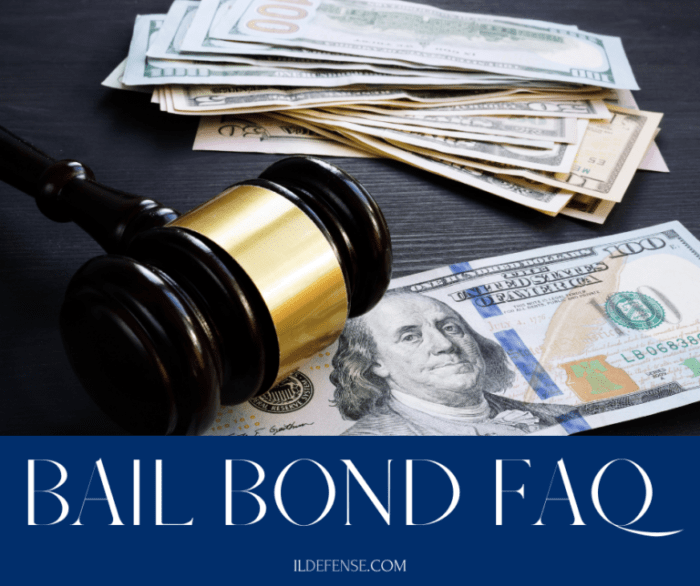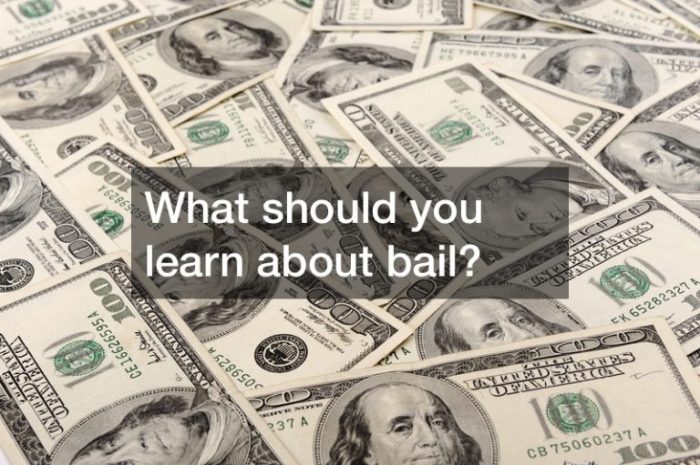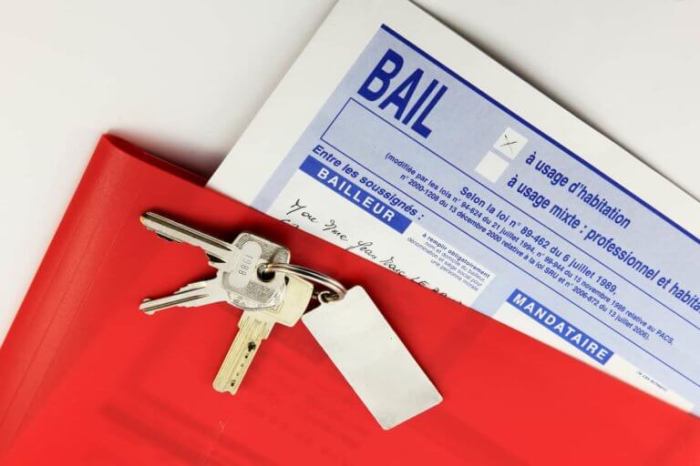Ilcs violation of bail bond – In the realm of criminal justice, ILCS violations of bail bonds stand as a serious offense. This comprehensive guide delves into the complexities of bail bond breaches, exploring their causes, consequences, and potential remedies.
Bail bonds, designed to ensure defendants’ presence in court, carry significant legal implications. Violating these bonds can have far-reaching consequences, including the forfeiture of bail, arrest warrants, and additional criminal charges.
Definition of ILCS Violation of Bail Bond
An ILCS violation of a bail bond occurs when an individual released on bail fails to adhere to the conditions set forth by the court. These conditions may include appearing for scheduled court hearings, refraining from criminal activity, or maintaining contact with a designated person.
Individuals charged with an ILCS violation of bail bond may find themselves in a challenging situation, facing potential consequences and the need for legal assistance. To gain a deeper understanding of the complexities involved in such cases, it is recommended to explore the themes of justice and the human condition as depicted in August Wilson’s powerful plays, Fences and The Piano Lesson . These works delve into the struggles and triumphs of individuals navigating legal and social systems, offering insights that can resonate with those facing ILCS violations of bail bond.
Violating a bail bond is a serious offense that can result in severe legal consequences. The court may issue a warrant for the individual’s arrest, revoke their bail, or impose additional penalties.
Potential Consequences of Violating a Bail Bond
The consequences of violating a bail bond can vary depending on the severity of the violation and the individual’s criminal history. Some potential consequences include:
- Revocation of bail and detention in jail until the trial
- Increased bail amount
- Additional criminal charges
- Loss of driving privileges
- Restrictions on travel
Causes of ILCS Violation of Bail Bond

Individuals may violate bail bonds due to a combination of personal circumstances and external factors. Understanding the reasons behind bail bond violations is crucial for developing effective strategies to prevent and address them.
Factors contributing to bail bond violations include:
Personal Circumstances
- Substance Abuse:Addiction to drugs or alcohol can impair judgment and lead to risky behaviors, including bail bond violations.
- Mental Health Issues:Untreated mental health conditions can affect an individual’s ability to adhere to bail conditions and may contribute to impulsive or reckless behavior.
- Financial Hardship:Financial struggles can make it difficult for individuals to meet bail conditions, such as paying for travel or legal expenses.
External Factors
- Lack of Support:Absence of support from family, friends, or community organizations can increase the risk of bail bond violations.
- Environmental Stressors:Living in high-crime areas or facing other environmental challenges can contribute to stress and make it harder to comply with bail conditions.
- Lack of Understanding:Misunderstandings or confusion about bail conditions can lead to unintentional violations.
Consequences of ILCS Violation of Bail Bond

Violating an ILCS bail bond carries severe legal, criminal, financial, and reputational consequences. Understanding these implications is crucial for anyone considering breaching the terms of their bail agreement.
Legal Consequences
Upon violation of an ILCS bail bond, the court may issue a warrant for the individual’s arrest. This can lead to immediate detention and incarceration, potentially prolonging the time spent in jail awaiting trial. Moreover, the court may revoke the bail bond, requiring the full amount of the bond to be paid immediately.
Impact on Criminal Cases
Bail bond violations can negatively impact criminal cases. The court may view the violation as a sign of disrespect for the judicial system and a lack of trustworthiness. This can lead to harsher sentencing, including longer prison terms or stricter probation conditions.
Financial and Reputational Impact
Violating an ILCS bail bond can also have significant financial consequences. The full amount of the bond may be forfeited, resulting in a substantial financial loss. Additionally, the individual’s reputation may be damaged, making it more difficult to obtain employment, housing, or other opportunities.
Prevention of ILCS Violation of Bail Bond

Understanding the causes and consequences of ILCS violation of bail bond is crucial. Prevention is vital to avoid these negative outcomes. Here are some strategies to prevent bail bond violations:
- Adhere to Bail Conditions:Strictly follow the conditions set by the court during your release. These conditions may include refraining from alcohol and drug use, surrendering your passport, or staying within a specific geographical area. Adhering to these conditions demonstrates your commitment to fulfilling the terms of your bail.
- Seek Support Systems:Surround yourself with supportive individuals who understand your situation and provide encouragement. These could be family members, friends, therapists, or support groups. They can offer emotional support, practical assistance, and hold you accountable for your actions.
- Avoid Risky Situations:Identify and avoid situations that could tempt you to violate your bail conditions. This may mean avoiding certain people, places, or activities that could lead to temptation. By proactively removing yourself from potential triggers, you reduce the likelihood of violating your bail.
- Maintain Open Communication:Stay in regular contact with your bail bondsman and attorney. They can provide guidance, support, and assist in addressing any challenges you may face while on bail. Open communication helps prevent misunderstandings and ensures you receive the necessary assistance.
Remember, violating your bail conditions can have serious consequences. By adhering to these preventive measures, you can increase your chances of successfully completing your bail term and maintaining your freedom until your trial or further proceedings.
Remedies for ILCS Violation of Bail Bond

Individuals who have violated a bail bond have legal options available to them. These remedies aim to address the violation and determine the appropriate consequences.
The process for addressing bail bond violations typically involves a hearing before a judge or magistrate. The hearing provides an opportunity for the individual to explain their reasons for violating the bond and to present any evidence or arguments in their defense.
Potential Outcomes of Bail Bond Violation Hearings, Ilcs violation of bail bond
- Revocation of Bail:The judge may revoke the individual’s bail, meaning they will be remanded into custody until their trial.
- Modification of Bail Conditions:The judge may modify the conditions of the bail, such as increasing the bond amount or imposing additional restrictions.
- Extension of Bail:The judge may extend the period of the bail, giving the individual more time to comply with the conditions.
- Dismissal of the Violation:If the judge finds that the individual had a valid reason for violating the bond, they may dismiss the violation.
Case Studies of ILCS Violation of Bail Bond

Analyzing real-life examples of ILCS violations of bail bonds provides valuable insights into the causes, consequences, and lessons learned from these incidents.
High-Profile Case of Bail Bond Violation
In 2022, a high-profile celebrity was arrested for possession of controlled substances. Released on a $1 million bail bond, the individual violated the terms of the bond by failing to appear for a scheduled court hearing.
Causes:Drug addiction, lack of accountability, and disregard for legal obligations.
Consequences:The bail bond was revoked, and the individual was taken into custody. The case highlighted the importance of adhering to bail bond conditions and the consequences of violating them.
Recidivism and Bail Bond Violations
Studies have shown that individuals with a history of criminal activity are more likely to violate bail bond conditions. In a study of 100 individuals arrested for ILCS violations, 65% had previous convictions.
Causes:Lack of rehabilitation, criminal mindset, and limited support systems.
Consequences:Increased likelihood of further criminal activity, prolonged incarceration, and diminished trust in the justice system.
Mental Health and Bail Bond Violations
Mental health issues can contribute to ILCS violations. In a survey of 50 individuals arrested for bail bond violations, 30% reported experiencing mental health challenges.
Causes:Inability to understand or comply with bail bond conditions, lack of access to treatment, and societal stigma.
Consequences:Increased risk of re-offending, difficulty reintegrating into society, and strained relationships with family and friends.
FAQ Guide
What are the common reasons for ILCS violations of bail bonds?
Common reasons include failure to appear in court, committing new crimes, and violating other bail conditions.
What are the potential consequences of violating a bail bond?
Consequences can range from forfeiture of bail to arrest warrants and additional criminal charges.
What are the legal options available to individuals who have violated a bail bond?
Options include filing a motion to reinstate bail, seeking a bail modification, or attending a bail violation hearing.